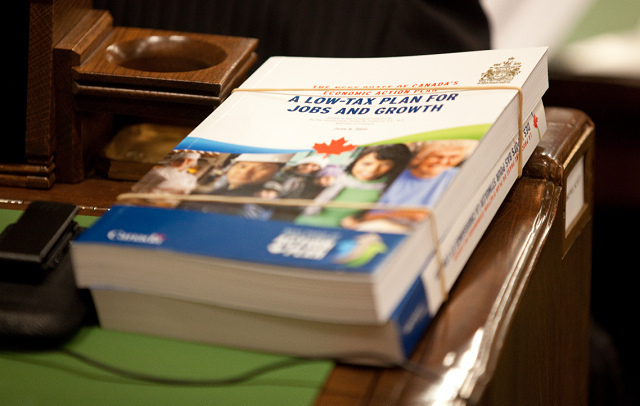You can change the economic conversation. Chip in to rabble’s donation drive today!
On budget day, the CBC, CTV, Global, the Globe and Mail, the National Post, and the major dailies across Canada focus their coverage on the government deficit. Did it go down? By how much? When can we expect a balanced budget? A surplus?
Whether or not the budget is balanced affects the Canadian economy, but not in the way the media spin suggests. A deficit is not bad and a surplus is not good. That thinking works for a corner store, or a retired couple, not for the biggest player in the economy.
The deficit is the amount the federal government adds to the economy. That’s good unless you think the economy is getting too strong. The surplus is what the federal government takes out of the economy, money that could be used instead by Canadians.
The Canadian economy is made up of a government sector and a private sector. When one is in surplus, the other has to be in deficit. When the government sector is heading towards surplus, that means the private sector is going in the other direction, towards deficit. In other words, when the government reduces its deficit (say, by cutting public spending), it pushes the private sector into deficit. There is no way that deficit reduction can be good, not when the Canadian economy is as weak as it is today.
The economic weakness is revealed by looking at the two parts of the private sector: households (families and individuals) and firms (of all sorts). Canadian households are deficit spending. Household debt keeps going up. Canadian businesses are saving rather than investing, sitting on loads of cash rather than making investments. The overall private sector surplus is really due to business sitting on its assets while households borrow to meet ends meet.
As a result of business reluctance to spend, employment growth is negative. New jobs created are insufficient to employ all those coming into the job market, let alone those still looking for work. Trying to cut back government spending only makes things worse.
In times of weakness, trumpeting a falling deficit as a success as Finance Minister Flaherty does is simply wrong. In a weak economy, a shrinking deficit indicates the government will be slowing the economy even more, when it should be helping out.
Preoccupation with the federal budget deficit focuses attention on the wrong economic issue, and even on the wrong deficit.
The Canadian economy is part of the world economy. Overall Canada is running a current account deficit with the rest of the world, spending more abroad than foreigners are spending in Canada.
Canada has a spending deficit abroad because Canadians buy more outside Canada than foreigners buy from Canadians. Weak spending by foreigners on Canadian goods and services signals the Canadian private sector economy is under-performing. This deficit in the overseas accounts (or balance of international payments) adds to the strength of other economies and weakens the Canadian economy. A weaker private sector means the Canadian government must take up the slack.
When foreigners find their own goods and services or those from other countries more attractive than what Canada has on offer, expect Canadians to see things the same way.
The current account deficit has led to a falling Canadian dollar. Recently, the exchange rate has fallen from near parity with the U.S. dollar to below 90 cents U.S. A weaker Canadian dollar makes purchases abroad more expensive, and reduces the cost to foreigners of Canadian goods and services.
A weak dollar should provide a temporary boost to the economy to offset the weakness inflicted by the falling government deficit. A falling currency also tells Canadians to focus on domestic economic weaknesses.
The real economic story is continued private sector weakness dating back to the big slump in 1981-82. What happened next was a big policy shift to a free trade, de-regulation, privatization, government austerity agenda. These policies continues to fail Canadians as evidenced by poor employment numbers, growing inequalities and now a current account deficit.
On budget day, the federal government focuses on its deficit reduction plans. What its spending cuts are doing to provincial or municipal government finances needs to be the bigger part of the story for the media. It is the overall direction of government spending that matters for countering economic weakness.
The federal government is moving towards surplus at the expense of other levels of government, making things worse for everybody. That’s the meaning of the falling deficit for Canadians you will hear about on budget day.
Duncan Cameron is the president of rabble.ca and writes a weekly column on politics and current affairs.
Like this article? Chip in to keep stories like these coming!
Photo: pmwebphotos/flickr



